Last Updated on 8 months ago by Kasey Lynch

Have you ever dreamed of hitting the open road with your home on wheels? Whether you’re planning weekend camping trips or considering the Recreational Vehicle (RV) lifestyle full-time, getting started can feel overwhelming.
That’s why I created this complete beginner RV buyers guide to walk you through everything you need to know — from understanding RV types to deciding what features actually matter.
This guide is packed with beginner RV tips, key terms to know, and the most important questions to answer before you ever step foot on a dealership lot. Let’s find you the best beginner RV for your lifestyle and travel goals!
What’s On Deck:
Beginner RV Tips to Know Before You Dive In
Starting your RV journey is exciting, but with ample options to choose from, it’s easy to get overwhelmed. That’s where this guide comes in!
I spent 6 months researching everything there is to know about RVs, which meant I learned almost everything the hard way, so you don’t have to.
Here are some tips to help you get started on the right foot:
- Start with your “why.” Are you looking for weekend adventures, cross-country trips, or full-time RV life? Your travel goals will shape the type of RV you need.
- Consider renting before buying. Test different RV styles by renting one for a weekend. It’s the best way to learn what layout and size suit your needs.
- Plan for storage and maintenance. RVs need a place to park when not in use and regular maintenance like any other vehicle.
- Join RV communities. Facebook groups, forums, and YouTube channels are goldmines of real-world advice and beginner RV tips.
RV Types Explained (And What They Mean for You)
Did you know there are eight different types of RVs? I didn’t either — until I started doing some research. I was surprised to learn that everything from travel trailers to camper vans falls under the RV umbrella.
While you likely won’t be shopping across all RV types as a beginner, here’s a quick breakdown of each category:
RV Motorhomes
Just like it sounds, this category includes motorhomes—RVs you can drive rather than tow. Here are the different classes within this category to be aware of:
Class A Motorhome
The biggest of the bunch. These are luxury homes on wheels, often with residential-style kitchens, full bathrooms, and multiple slide-outs.
Best for: Long-term travelers or full-time RVers who want max space and amenities.
Class B Camper Van
Compact, fuel-efficient, and easy to drive. These are great for solo travelers or couples.
Best for: Travelers who value mobility and simplicity over space.
Class C Motorhome
Sits between Class A and B in terms of size, and commonly features an overhead bunk, making it a popular option for families.
Best for: Families or first-time buyers looking for balance between comfort and drivability.
Travel Trailers vs. Fifth Wheels (Towable RVs 101)
If you prefer to tow your RV with your own vehicle, there are several towable options to consider:
Lightweight Trailers
Smaller, easier to tow, and budget-friendly. These trailers work with smaller SUVs and trucks.
Best for: Beginners who want a more nimble, fuel-efficient setup.
Travel Trailers
These are towable RVs that attach to a standard hitch behind your vehicle. They come in a wide range of sizes and layouts.
Best for: First-time RVers who already own a capable tow vehicle.
Fifth Wheel Trailers
These require a special hitch mounted in the bed of a pickup truck. They often offer more living space and better stability while towing.
Best for: Travelers with a pickup truck who want extra space and comfort.
Expandable Trailers
These trailers feature fold-out beds or pop-out sections that expand when parked.
Best for: Campers who need a compact unit with extra sleeping space.
Toy Haulers
These combine living quarters with a garage space for ATVs, bikes, or gear.
Best for: Adventure seekers who travel with toys.
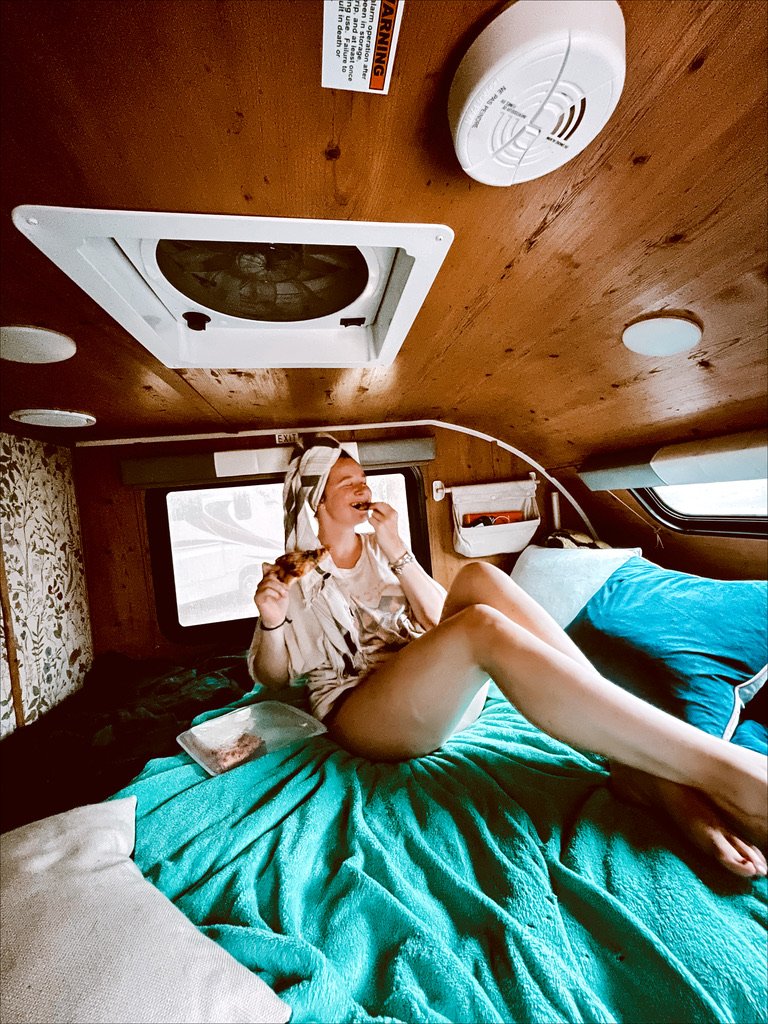
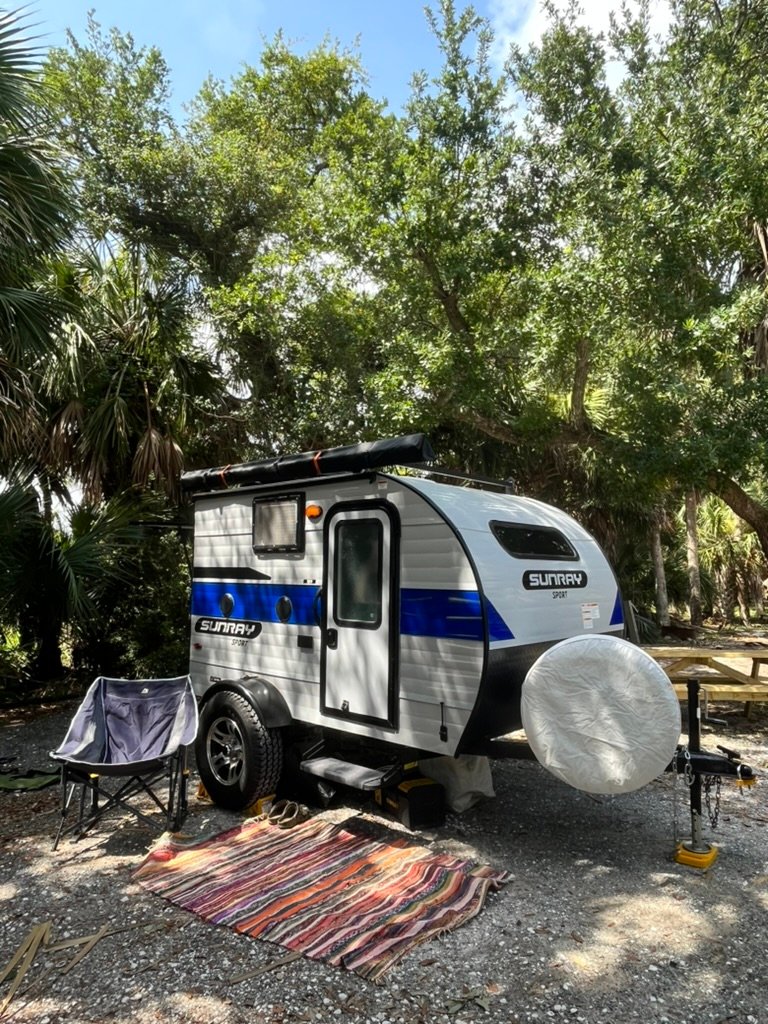
RV vs. Camper vs. Travel Trailer — What’s the Difference?
This is one of the most common beginner RV questions, so let’s clear things up:
- RV (Recreational Vehicle): A general term that usually refers to drivable motorhomes.
- Camper: A casual term often used interchangeably with RV or travel trailer.
- Travel Trailer: A specific type of camper that is towed behind a vehicle. It’s not drivable on its own.
Think of it this way: RVs are homes you drive; travel trailers are rooms you tow.
Related: Exploring the Open Road: 5 Reasons Travel Trailers Trump Camper Vans
Technical RV Terms You Should Know Before You Shop
Looking through spec sheets for RVs is like reading alphabet soup. When you’re excited about all the possibilities, it can be discouraging when you come across an RV you love but have no idea how to decipher the mechanics to ensure it aligns with your needs or your towing capacity. But don’t worry! Here’s a quick glossary of terms to help you shop smarter:
- GVWR (Gross Vehicle Weight Rating): The maximum total weight your RV can safely carry.
- Hitch Weight: How much weight your trailer puts on the hitch of your tow vehicle.
- Black Tank: Holds waste from the toilet.
- Grey Tank: Holds used water from the sink and shower.
- Dry Weight: The weight of the RV without any gear, water, or people inside.
- Slide-Outs: Expandable sections that add space when the RV is parked.
- Boondocking: Camping off-grid without hookups.
- 30 vs. 50 Amp: Refers to how much electrical power your RV can draw from the hookup.
Understanding How Technical Terms Affect Your Buying Journey
Although having quick definitions is helpful, learning how to apply them is a different challenge altogether. Here’s a quick outline of the most important definitions and how they influence your buying journey:
Match the GVWR to your tow vehicle’s towing capacity
The GVWR (Gross Vehicle Weight Rating) tells you the maximum the RV can weigh when fully loaded. Your tow vehicle’s towing capacity should always be greater than the trailer’s GVWR — ideally with some buffer. Towing at or above your vehicle’s limit can not only damage your engine and brakes but also void your insurance in the event of an accident.
Don’t confuse dry weight with what you’ll actually tow
Dry weight is the trailer’s weight without water, gear, food, or propane. Once fully loaded, the total weight will likely increase by several hundred to over a thousand pounds, bringing it closer to the GVWR. Always plan for this extra weight when checking your towing limits on your tow vehicle.
Know your hitch weight and how it affects vehicle handling
The hitch weight is how much pressure the trailer puts on your tow vehicle’s rear hitch. Too much hitch weight can make steering feel light or cause your vehicle to sag in the back. Distribute weight evenly inside the trailer and use a weight distribution hitch if necessary.
Amp up your knowledge: 30-amp vs. 50-amp hookups
Beginner RVers should know what electrical service their RV uses. Most smaller travel trailers use 30-amp service, while larger fifth wheels and Class A motorhomes often require 50-amp. Know what you’re plugging into at RV parks to avoid tripping breakers — or worse, damaging your RV’s electrical system.
For example, my Sunray 109 Sport is a 30-amp, but I carry a 50-amp converter if I rent a campsite that only offers a 50-amp hookup. Think of this like packing an international plug converter for your phone when you’re traveling overseas, but on steroids.
Slide-outs add space, but also weight and maintenance
Many new RVers love slide-outs for the extra room they offer when parked. Just remember, they add weight and complexity — check for smooth operation and make sure there’s room to extend them even when your RV is parked in a tight site. You’ll also commonly see that campsites will state if they can or cannot accept slide-outs. Make sure you keep an eye out for these requirements to ensure you can stay at a campground comfortably.
10 Questions to Ask Before Buying Your First RV
If you’re thinking, “Great, I know more than I did, but I still don’t know where to start,” then you’re in luck. These 10 questions are the BEST place to start your journey.
Once you have set answers for each, you can kickstart your research journey with aligned intention, narrowing down your options significantly.
- Do you want to drive your RV or tow it?
- Will you use it for weekends or full-time living?
- Do you want a bathroom on board?
- Do you want an indoor or outdoor kitchen?
- What’s your budget (including insurance and maintenance)?
- What kind of vehicle do you already own — can it tow a trailer?
- Will you mostly stay at RV parks or camp off-grid?
- Do you need space for kids or pets?
- How much storage space do you need for gear, food, and clothes?
- Do you want extras like Wi-Fi, solar panels, or a generator?
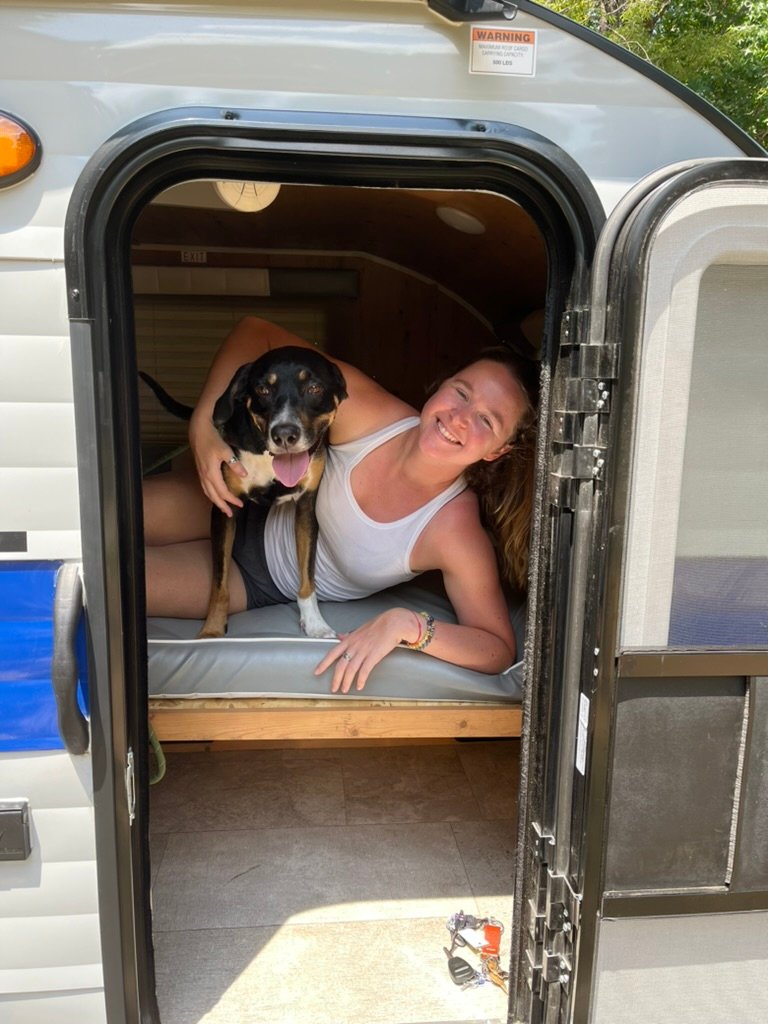
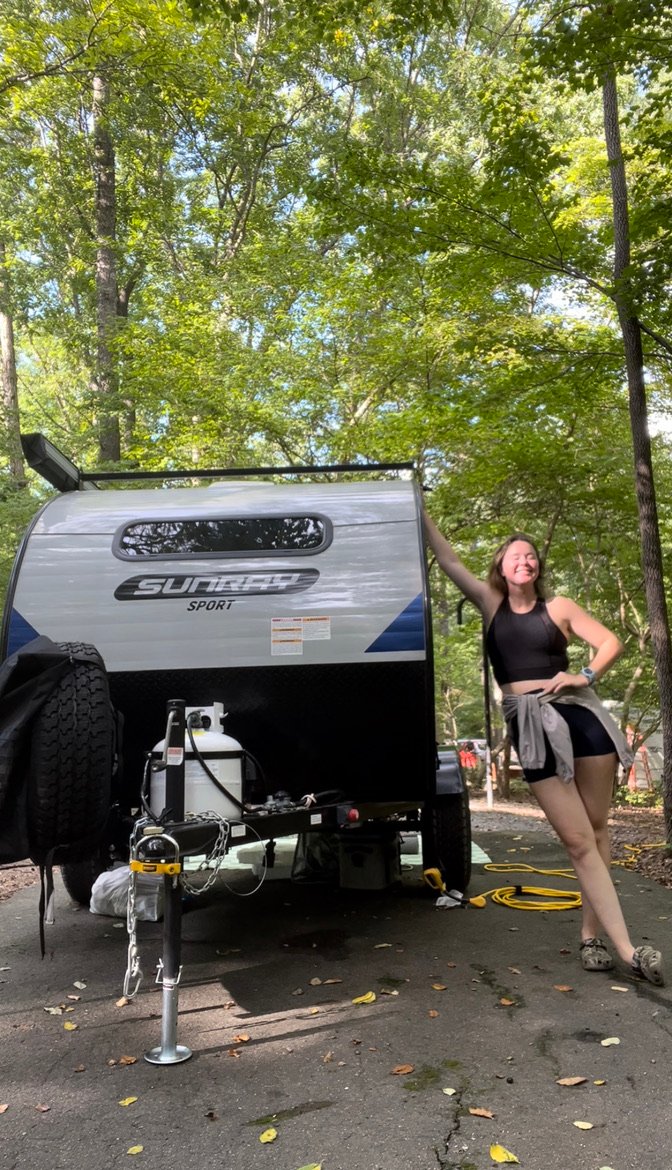
What’s the Best Beginner RV?
There’s no one-size-fits-all answer, but the best beginner RV is one that:
- Fits your travel style and budget
- Matches your comfort level with towing or driving
- Is easy to maintain and store
- Doesn’t overwhelm you on your first trip
Here are a few popular choices for beginners:
- Class C Motorhomes: Great all-around option with space and drivability.
- Lightweight Travel Trailers: Affordable, towable with smaller vehicles, and easy to manage. Browse a comprehensive collection of lightweight travel trailers here >
- Class B Camper Vans: Compact and simple for weekend travel or solo adventures. Here’s a thorough guide written by another blogger to help you on your camper van journey >
Related: 10 Best Lightweight Travel Trailers with Bathrooms for Your Next Adventure
FAQ: Beginner RV Questions Answered
What is the best RV for a beginner?
The best beginner RV is usually a lightweight travel trailer or a Class C motorhome. Both offer a good balance of space, comfort, and ease of use. Lightweight trailers are easier to tow, and Class C RVs drive more like a large van or truck, making them ideal for new RVers.
Should I buy a drivable RV or a towable one?
It depends on your comfort level and current vehicle. Drivable RVs (Class A, B, and C) are great if you don’t want to worry about hitching or towing. Towable RVs (like travel trailers and fifth wheels) can be more affordable and allow you to explore without moving your entire setup each time.
Do I need a special license to drive or tow an RV?
In most states, you do not need a special license to drive or tow an RV under 26,000 lbs. However, always check your state’s DMV rules to be sure—some states have exceptions for larger Class A motorhomes or fifth wheels.
What size RV is best for beginners?
Many first-time RVers start with 20–30 ft trailers or motorhomes. They’re big enough for comfort but still manageable on the road and in campgrounds. Anything longer can feel overwhelming for new drivers or towers.
How much can my car tow?
Check your vehicle’s owner’s manual or manufacturer’s website for towing capacity. Make sure the GVWR of your RV is below your towing capacity, and factor in extra weight from water, propane, and gear.
What does GVWR mean, and why is it important?
GVWR stands for Gross Vehicle Weight Rating — the maximum weight an RV can safely carry, including gear, water, and passengers. Staying within this limit is crucial for safe towing, brake performance, and insurance compliance.
Is it better to rent or buy an RV for your first trip?
If you’re new to RVing, renting is a great way to test different RV types before committing. It helps you figure out what layout and features you really need, and whether driving or towing suits you best.
What should I budget for RV ownership?
Besides the RV itself, factor in costs for insurance, fuel, maintenance, storage, campground fees, and accessories (like hoses, leveling blocks, and a surge protector). A realistic annual budget helps prevent surprises.
For context, I’ve rented a 30ft parking space for $150/mo as well as a 20ft parking space for $65/mo. Do your best to shop around to get an idea of what storage would cost you if you can’t park it at your current residence.
Additionally, fuel consumption generally goes up when you’re towing. You should double your current fuel spend on regular trips to get a ballpark idea of how much fuel might cost you on a trip of an equivalent distance.
P.S. Check your local Walmart for cost-effective necessities when outfitting your RV! You can also check out my Amazon list of beginner RV essentials here.
Final Thoughts
Choosing your first RV is a big decision, but with the right information, it doesn’t have to be intimidating. Use this beginner RV guide as your starting point, take your time exploring your options, and don’t be afraid to ask questions.
The road is calling — are you ready to answer?



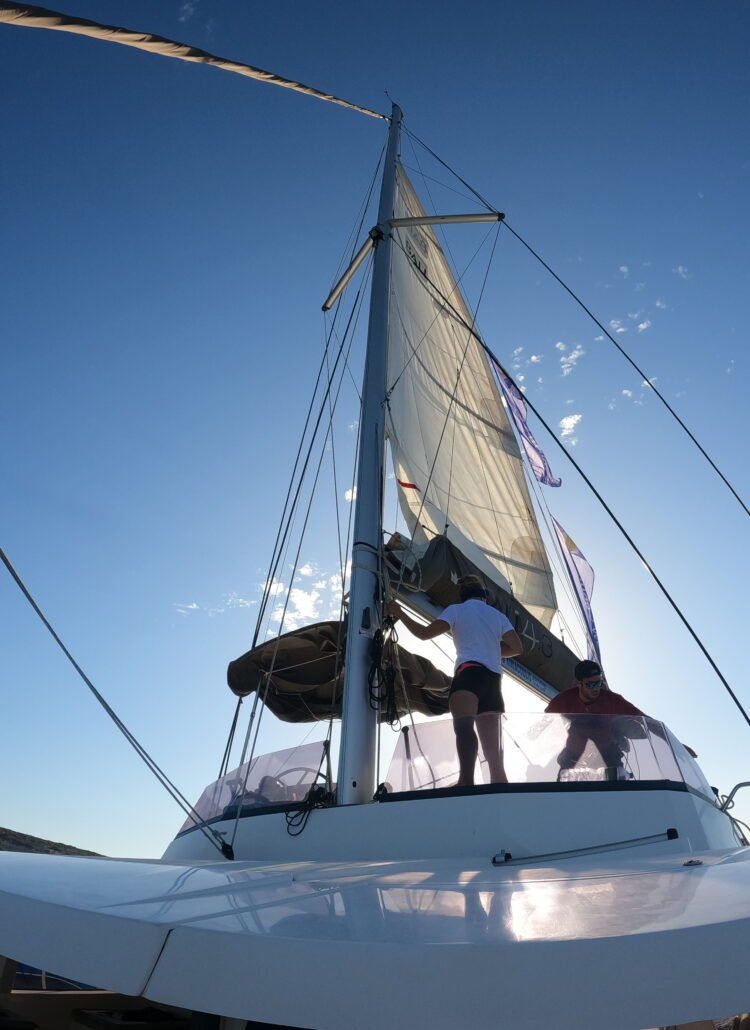

Leave a Reply